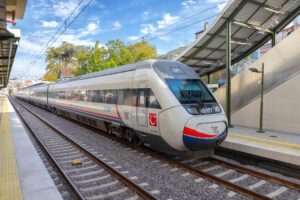
UK Export Finance (UKEF), the UK government’s export credit agency, has underwritten €781m of financing – equivalent to £680m – to support construction of a 286km high-speed electrified railway across southern Turkey.
With financing provided through UKEF’s Buyer Credit Facility, Rönesans Holding will finish construction of the Mersin-Adana-Gaziantep High Speed Railway on behalf of the Turkish Ministry of Transport.
The deal is expected to create new multimillion-pound export contract opportunities for the UK’s infrastructure, engineering and project management sectors, supporting the Prime Minister’s priority of growing the UK economy.
This signals key future opportunities for UK exporters, with Rönesans Holding – one of Europe’s ten largest construction companies – intending to use the high-speed rail project to build its wider relationships with the UK supply chain.
Speaking about the announcement, Lord Offord, Minister for Exports, said: “The UK-Turkey trading relationship is going from strength to strength. Last year, UK exports to Turkey reached £8.5 billion, and this week we announced plans for an updated trade deal that will further boost exports and imports between our countries.
“UK Export Finance’s backing for this transformative high-speed railway adds to this success story. This deal shows that the UK, home to the world’s first railway system, still moves full steam ahead with its export of railroad innovation and expertise.”
UKEF’s backing – which has been given on the condition that UK exporters supply to the project – will support continued economic growth in the UK, in line with the government’s priorities; Rönesans Holding has already engaged with UK suppliers to negotiate contracts for electronic infrastructure, ESG consultancy services, catenary and mechanical components.
UKEF worked in partnership with J.P. Morgan, ING Bank and BNP Paribas, who provided the loan, as well as SACE and OeKB – the Italian and Austrian export credit agencies providing reinsurance – to secure this landmark deal for Turkish rail infrastructure.
Dr. Erman Ilıcak, President of Rönesans Holding, said: “We’re thrilled to be working with UKEF, JP Morgan, ING and BNP to secure a deal that will enable a landmark shift in the Turkish construction of rail links and the high-speed railway project.
“By upgrading the existing railway line to a high standard railway line, we will be actively reducing negative environmental impact while offering a lower-carbon travel alternative and significantly enhancing the region’s industrial connectivity and trade. Rönesans Holding takes immense pride in contributing to Turkey’s national environmental goals and infrastructure advancement.
“Our fruitful collaboration with British Exporters has secured €781m in financing for the transformative high-speed electrified railway in southern Turkey, adding tremendous value to the cooperation between Türkiye and UK exports and services while paving the way for exciting global partnerships.”
John Meakin, Global Head of Export and Agency Finance at J.P. Morgan, said: “This project is expected to reduce traffic congestion on the motorways and promote more sustainable transportation in the region. We are honoured to have the responsibility to deliver the financing for this impactful project while supporting UK exporters providing goods, services and notable technical expertise.”
In replacing the current railway, which relies on diesel locomotives, the electrified line will provide a lower-carbon alternative to existing routes between Mersin and Gaziantep. Project forecasts suggest that the completed route will save 157,000 tonnes in CO2e emissions in its first year alone.
The UKEF-backed project will also contribute directly to Turkey’s objective of increasing high-speed railway coverage to 10,000km, by creating a rail link greater than the distance between Cardiff and London.
Able to carry trains travelling up to 200 km/h, this transport link is a major step forwards for regional infrastructure and growth. The high-speed railway will reduce the travel time from Gaziantep – via regional cities Adana and Osmaniye – to Mersin by four hours. Mersin is the second largest container port in the country and a thriving city of over one million people.
Treasury and Finance Minister for Türkiye, Mehmet Şimşek, concluded: “Mersin, Adana and Gaziantep are among the highly industrialized and important cities of the region with their deep-rooted cultural heritage. This project will ensure a reduction of transportation costs, decrease travel time between Mersin and Gaziantep and strengthen our railway connectivity.
“In this regard, this project is crucial for economic, social and environmental integration. We are very grateful to our trading partner UKEF for their contribution to this important project, which will expand the national railway network.
“The most important aim of the project is to improve the rail connectivity and create a sustainable alternative transportation scheme in Türkiye. We look forward to continuing our fruitful collaboration with new projects on the way of development of Türkiye.”
Gaziantep, the railway’s eastern terminus, was near the epicentre of the 7.8 magnitude earthquake which struck Turkey in February 2023. The UKEF-backed project for completing this railway will also contribute to reconstruction in Gaziantep, Osmaniye and other areas of southern Turkey severely damaged in this disaster.
Read more:
UK announces £680m for new high-speed electric railway in Turkey





